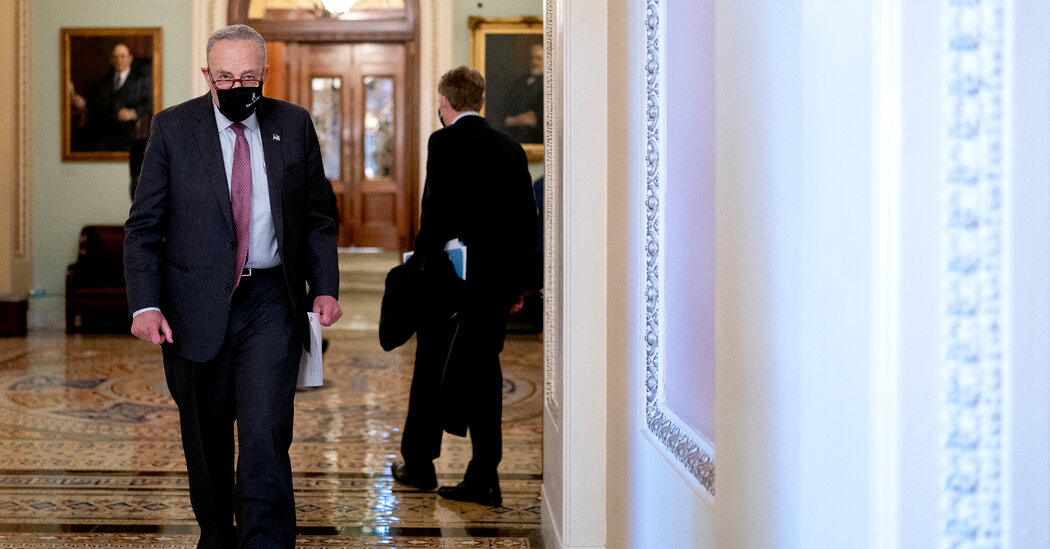

WASHINGTON — A divided Senate on Tuesday approved legislation that would raise the debt ceiling by $2.5 trillion, a move to stave off the threat of a first-ever federal default until at least early 2023.
All Democrats supported the measure, which passed the Senate 50 to 49 along party lines, sending it to the House for final passage and then to President Biden for his signature. One Republican, Senator Cynthia Lummis of Wyoming, was absent, and the rest of the Republican conference opposed the measure.
The swift action came a week after party leaders announced a deal to establish a one-time fast-track process to increase the debt ceiling on a simple majority vote, instead of the 60 votes needed to move most legislation through the Senate.
The vote occurred with little time to spare before a potential default, which would be catastrophic for the national economy and jeopardize the full faith and credit of the United States. The Treasury Department had warned that it would be unable to pay the nation’s bills soon after Wednesday, and the agency is currently using so-called “extraordinary measures,” a series of fiscal tools to delay the threat of a default.
In a statement backing the measure, the White House praised Senate leaders for “fulfilling this fundamental legislative and constitutional responsibility.”
Senator Chuck Schumer of New York, the majority leader, said on Tuesday that the $2.5 trillion figure would be enough to punt the threat of a default past the midterm elections next year, an assessment shared by the Treasury Department, according to a person familiar with its internal estimates. The debt limit, which covers debt incurred by administrations from both parties, is currently set at $28.9 trillion.
“The American people can breathe easy and rest assured there will not be a default,” Mr. Schumer said in a speech on the Senate floor on Tuesday. He thanked Republicans, including Senator Mitch McConnell of Kentucky, the minority leader, for their help in setting up the process and resolving a must-pass piece of fiscal legislation before the end of the year.
A handful of Republicans, while opposed to the debt limit increase, ended their party’s monthslong blockade of debt-limit legislation by voting last week to create the expedited process. Republicans had spent months refusing to allow Democrats to take action on long-term legislation raising the debt ceiling, using the filibuster to stall any action.
Some Democrats argued that the contortions were evidence that Congress should dispose of the process altogether, rather than periodically running up against potentially catastrophic fiscal cliffs, only to set up new ones in the future.
“I think it’s very clear that this debt ceiling process has got to go,” said Senator Ron Wyden, Democrat of Oregon and the chairman of the Finance Committee. “It is now a tool for politicians for political purposes, and it just defies common sense.”
Other Democrats suggested that the convoluted workaround was further evidence that the filibuster itself should be scrapped, or that similar exceptions should be made for other Democratic priorities.
“We have decided that we must do it for the economy, but not for the democracy,” Senator Raphael Warnock, Democrat of Georgia, said in a speech on the Senate floor. Mr. Warnock argued that a similar special process should be created for passing voting rights legislation that has been filibustered by Republicans.
But creating such a process would take the support of at least 10 Republicans, and only one has been willing to join Democrats in support of taking up a voting rights measure. By contrast, 14 Republicans joined Democrats last week in voting to allow the Senate to take up a bill permitting the debt limit to be raised with a simple majority vote.
On Tuesday, Republicans were eager to have Democrats go on the record in support of the increase. Republicans could cite those votes in the future as they seek to criticize Democrats for excessive spending and adding to the national debt.
In a floor speech on Tuesday, Mr. McConnell made no mention of the deal he struck with Mr. Schumer to allow the increase to occur, but he noted that the debt ceiling would be raised solely with Democratic votes. He also denounced Mr. Biden’s $2.2 trillion social safety net, climate, and tax package that is making its way through Congress, warning that it would exacerbate inflation and lead to the accumulation of more debt.
Understand the U.S. Debt Ceiling
What is the debt ceiling? The debt ceiling, also called the debt limit, is a cap on the total amount of money that the federal government is authorized to borrow via U.S. Treasury bills and savings bonds to fulfill its financial obligations. Because the U.S. runs budget deficits, it must borrow huge sums of money to pay its bills.
“If they jam through another reckless taxing and spending spree, this massive debt increase will just be the beginning,” Mr. McConnell said. “More printing and borrowing to set up more reckless spending to cause more inflation, to hurt working families even more. The American people need a break.”
But Mr. McConnell has also fielded criticism from his right flank for allowing Democrats to steer the country away from a fiscal catastrophe.
“I’m sure this vicious tactic, the one used here, has not seen its last use — far from it,” said Senator Mike Lee, Republican of Utah. “With a blank check and a new special procedure, Democrats are able to raise the debt ceiling by whatever amount they deem necessary to accommodate their destroy America bill.”
Former President Donald J. Trump railed against Mr. McConnell in a series of statements over the weekend, charging that the senator “didn’t have the guts to play the debt ceiling card, which would have given the Republicans a complete victory on virtually everything.”
The former president continued to urge Republicans to remove Mr. McConnell from his leadership role.
On Monday, Kelly Tshibaka, a hard-line conservative challenging Senator Lisa Murkowski, Republican of Alaska, pledged that she would not support Mr. McConnell if elected in 2022, citing his role in the debt ceiling process.
Ms. Murkowski voted to set up the fast-track maneuver, and she appeared unbothered by the prospect of having it used against her.
“I’ve just got to do the best thing that I can for the country,” she told reporters. “And this is the best thing for the country — to avoid a default.”
Alan Rappeport contributed reporting.
